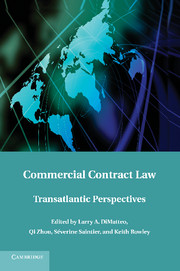Book contents
- Commercial Contract Law
- Commercial Contract Law
- Copyright page
- Dedication
- Brief Contents
- Contents
- Contributors
- Foreword
- Part I The Role of Consent
- Part II Normative Views of Contract
- Part III Contract Design and Good Faith
- Part IV Implied Terms and Interpretation
- 10 Implied Terms in English Contract Law
- 11 Contract Interpretation
- Part V Policing Contracting Behavior
- Part VI Misrepresentation, Breach, and Remedies
- Part VII Harmonizing Contract Law
- Index
10 - Implied Terms in English Contract Law
from Part IV - Implied Terms and Interpretation
Published online by Cambridge University Press: 05 February 2013
- Commercial Contract Law
- Commercial Contract Law
- Copyright page
- Dedication
- Brief Contents
- Contents
- Contributors
- Foreword
- Part I The Role of Consent
- Part II Normative Views of Contract
- Part III Contract Design and Good Faith
- Part IV Implied Terms and Interpretation
- 10 Implied Terms in English Contract Law
- 11 Contract Interpretation
- Part V Policing Contracting Behavior
- Part VI Misrepresentation, Breach, and Remedies
- Part VII Harmonizing Contract Law
- Index
Summary
The law of England and Wales, in respect of contracts, recognizes no general doctrine of good faith, such as exists in other jurisdictions. Nevertheless, various doctrines and techniques in the law, for instance misrepresentation, mistake, duress, and implied terms, are frequently seen as playing specialized roles in securing at least a minimum level of good faith. This chapter considers implied terms from this perspective and argues that they certainly have been used in this way but that, as a technique, implication of terms is neutral, in no small part because of the double-edged nature of the rules (term can be/must not be implied in given circumstances). Decisions which decline to imply a term are as telling about the technique’s tendency to secure good faith outcomes as those in which a term is actually implied.
- Type
- Chapter
- Information
- Commercial Contract LawTransatlantic Perspectives, pp. 225 - 239Publisher: Cambridge University PressPrint publication year: 2013
- 1
- Cited by

